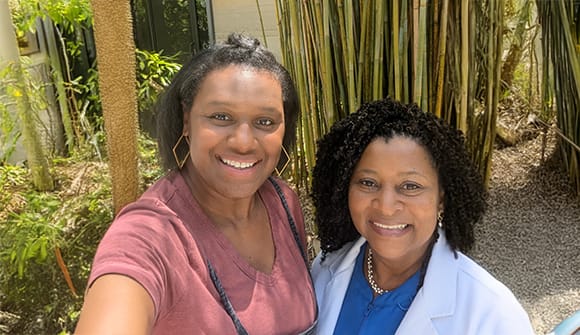Risky business
What it means to be faced with a high-risk pregnancy.
Article Author: Tina Smithers Peckham
Article Date:

Pregnancy can be stressful in and of itself, from ensuring a smooth labor and delivery to getting baby's nursery just right (bibs and bassinets and burp cloths...oh, my!). Tack on the term "high-risk," and your stress level is likely to skyrocket. Fret not, Mama. Keep your anxiety at bay with the most up-to-date information, and the right care for you and your baby.
What does "high-risk pregnancy" mean?
Many factors help determine whether a pregnancy is considered "high risk." According to maternal-fetal medicine specialist Kathryn Villano, MD, chief of Perinatal Services at Baptist Health and Wolfson Children's Hospital, the most common reasons for a high-risk pregnancy have to do with the expecting mother.
"A mom may have underlying medical conditions, such as high blood pressure or diabetes, that increase her risk of complications in pregnancy," Dr. Villano said. "She may already have a history of complicated pregnancies such as frequent miscarriages, preterm delivery, preeclampsia or pregnancy losses in the past."
Other factors may have to do with the baby, which could include specific birth defects, genetic conditions or a multiple pregnancy.
The pregnancy and age conundrum
Some women might be all too familiar with the phrase "advanced maternal age" – a term given to expectant moms over the age of 35 – though Dr. Villano jokingly likes to call it "The Well-Prepared Mom's Club."
"Most of my mamas over 35 are having a planned and much-desired pregnancy, often after finishing their education, achieving personal goals, establishing a career and then deciding to grow their family," she said.
So, why does age play such a role when it comes to high-risk pregnancies? Simply put, women over 35 have a greater chance of conceiving a pregnancy affected by an abnormal or extra chromosome, which could raise the risk of certain birth defects.
Luckily, screenings and special ultrasounds can be done early in the pregnancy to help diagnose these medical conditions and prepare parents-to-be for any special care or arrangements their baby may need. Another age-related factor is placenta function.
"The placenta is an organ that allows the mom's uterine blood vessels to grow and meet the baby's blood vessels, helping oxygen and nutrition pass from mom to baby," Dr. Villano explained. "Moms over 40 have a higher risk of placenta function problems because their blood vessels sometimes don't grow and change as readily. This can cause babies to be smaller at birth.
"Placenta function changes can also trigger high blood pressure complications in pregnancy such as pre-eclampsia," she added. "We monitor routinely for these complications and can help prevent them in the first place."
What happens if you have a high-risk pregnancy?
Don't panic. The key to remember is that if your OB/GYN does suggest you see a high-risk specialist, it's not necessarily a major cause for concern. Yes, you can still have a healthy pregnancy if you're considered high risk.
Get prenatal care
No matter the cause, a maternal-fetal medicine physician, also known as "a high-risk OB," like Dr. Villano is there to work alongside your trusted OB/GYN to help ensure both mom and baby stay as healthy as possible throughout the pregnancy. This additional support can be crucial in getting the best possible outcome for both.
"Maternal-fetal medicine specialists take care of all kinds of pregnancy complications and complex conditions. Sometimes, you may only have one or two visits to our office for counseling, screening tests or a specialized ultrasound, and some pregnancies will need to be monitored more carefully," Dr. Villano said. "But we provide lots of reassurance, too! More often than not, we're giving families good news."
Labor and delivery for high-risk pregnancies
When you're expecting, it's important to find the right provider for your needs, especially if you're experiencing a high-risk pregnancy. Learn more about Baptist Health's labor and delivery, high-risk obstetrics, newborn and neonatal intensive care services.



